Want to improve your English and have fun? Why not read an English magazine?
Are you ready to discover the 25 best magazines that will help you improve your English?
Great – let’s begin then!
You can jump straight to the English magazine that interests you most using the table of contents below.
Otherwise, keep scrolling to discover 25 incredible magazines in English.
Table of Contents
1. The Economist

Can you guess what The Economist is about? Yes, economics! But not only that.
This magazine also focuses on global events, politics, science, technology, and culture.
It sounds like I’m talking about a newspaper, doesn’t it?
Well, technically, The Economist is a British weekly newspaper printed in magazine format.
Important and well-known business people around the globe read The Economist (I wouldn’t be surprised if Elon Musk has a subscription to it) and this is why the language you’ll find in it is high-quality journalistic writing.
Once I had a student who worked as the CFO of a bank in Italy. He told me he always read The Economist because it helped him expand his advanced English vocabulary which he would then use in his financial reports and presentations.
So this is not the English magazine to read if you’d like to improve your conversational, informal, urban English.
However, if you want to learn specialised vocabulary related to economics, politics, and science, then yes, get a copy and have fun learning.
You can read The Economist online here.
2. National Geographic

This was once called The National Geographic Magazine.
Can you guess when the first issue was published?
I’ll give you three options (don’t read on until you haven’t answered this question):
- 1958
- 1888
- 1928
The answer is b. Yes, it’s over 100 years old! There’s a reason why this English magazine has stood the test of time: National Geographic is great!
You just need to flick through it for a few seconds to notice how beautiful and educational everything is.
The photos are taken by the most skilled photographers in the world. And the articles, too, are written by the best writers.
But what’s National Geographic about? Wildlife, archaeology, environmental issues, and cultural studies. Given that these are the main topics, the language you'll find is rich and descriptive.
So if you’d like to expand your descriptive vocabulary and you’re also into nature, exploration, and world culture, then National Geographic is a must.
You can read some National Geographic articles online here.
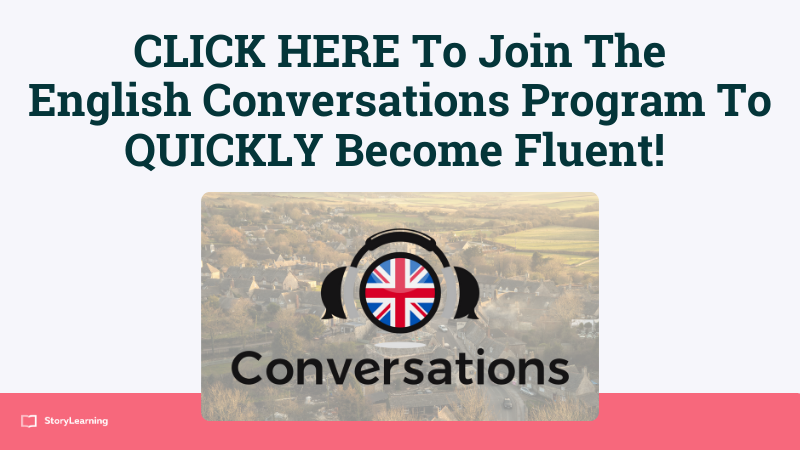
3. Speak Up
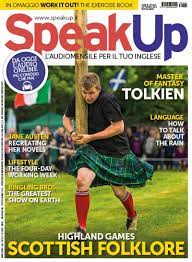
This magazine is produced for learners of English based in Italy and Spain. I read and translated the About page of the Speak Up Italian website.
This is what it says:
“Forget about grammatical rules and long lists to memorize. With Speak Up you’ll immerse yourself in the English spoken in the media by reading and listening to articles and interviews with famous people. You’ll improve your reading comprehension, listening, and pronunciation. You’ll expand your vocabulary with current terms, neologisms, trending concepts, idioms, and colloquial expressions.”
Speak Up
This is a special English magazine because it's designed with English learners in mind so the articles are classified and tagged according to the level of difficulty.
This is how they’re categorised:
- Pre-intermediate: Articles with common phrases in English and simple expressions.
- Lower-intermediate: Standard language articles on a wide variety of topics.
- Upper-intermediate: Complex texts on both concrete and abstract topics.
- Advanced: Long texts with a higher level of complexity that includes colloquial expressions and English idioms.
- Proficiency: Long articles with a complex structure featuring diverse descriptions and topics, and a rich and creative vocabulary.
But there’s more: most of the articles in Speak Up are available in audio format so you can listen to them while reading the text. This will help you improve both your listening skills and English pronunciation.
Get a subscription to Speak Up here
4. Babel
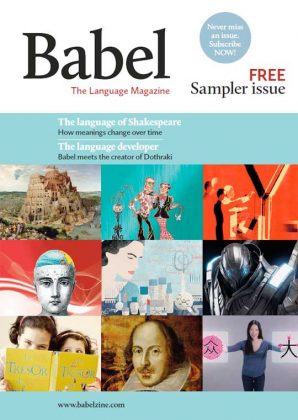
“Love language? Love Babel.”
This is what you read on page 1 of Babel, a popular language magazine written by experts in languages and linguistics whose mission is to bring you the latest linguistics research.
But you don’t have to be a language expert to appreciate this magazine. Everything is explained in an accessible and colourful format.
Babel is published every four months and each issue contains regular features. Some of these are:
- The linguistic lexicon: a section that explores linguistic terms such as “connotation” or “catenative verbs”.
- Languages of the world: this introduces you to languages spoken around the globe.
- Ask a linguist: a section where a linguist answers your questions on anything and everything about languages and linguistics.
The team behind Babel is so generous that they give access to their “Best Of” issue for free, which includes the best features taken from across their first 32 issues.
You can read it here and then decide if this is a magazine for you.

5. Forbes

This is another well-known magazine that’s been around for over a century.
Before I tell you what you can expect to find in it, let’s see if you can guess the answer to this trivia question: Where does Forbes take its name from?
Three options:
- The person who founded it
- A car
- A Greek word
Have you made your guess?
Okay, Forbes was founded in 1917 by Bertie Charles Forbes, a Scottish-American financial journalist who then remained the magazine's editor-in-chief until 1954.
But let’s come back to the present. Today, Forbes is published eight times a year and is one of the most popular business magazines in the world.
The articles you’ll find in it are about a wide variety of topics such as finance, investing, marketing, technology, communications, science, politics, and law.
What’s true for The Economist is also true for Forbes: this isn’t a magazine you would read to improve your conversational skills but one that can help you with academic vocabulary, academic reading and writing.
An interesting thing about Forbes is that it’s known for its lists and rankings such as:
- The richest Americans (the Forbes 400)
- The 30 most notable young people under the age of 30 (Forbes 30 under 30)
- America's Wealthiest Celebrities
- The world's top companies (the Forbes Global 2000)
- The World's Most Powerful People
- The World's Billionaires
If you’re especially interested in American culture and business, well, you should also be interested in getting your eyes on Forbes.
6. English NOW
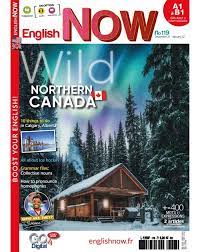
Le plaisir d'apprendre l'anglais tout en se divertissant.
That’s French for “The pleasure of learning English while having fun” and it’s what English NOW, a bimonthly 48-page magazine specially written for learners of English based in France, will help you to do.
English NOW offers a variety of articles and topics but you’ll also find vocabulary, grammar, and tests. Remember SpeakUp (no. 3 on this list)?
English NOW is similar to that because each article is categorised according to its level of difficulty as well as which English-speaking country it focuses on (United Kingdom, United States, Australia, etc.).
If you subscribe, you can get your magazine articles read by native speakers with different accents. You’ll also get interactive exercises that focus on all four language skills, multimedia content, and teacher bonuses (if you’re a teacher).
Oui mon ami, c'est un super magazine si tu veux améliorer ton anglais!
Find out more about English NOW here.
7. Time

You may already know about this American magazine as it’s one of the most influential and authoritative sources of news.
But let’s see if you can guess which of these statements about it is false:
- Time was published weekly for nearly a century.
- There are European, Asian, and South Pacific editions of Time.
- There are editions of Time written in easy English specifically for learners like you.
Which one is false?
I’m afraid to say that the answer is C: at the moment, there are no versions of Time written for learners of English. But don’t worry. If you already have strong English reading skills, Time can help you expand your vocabulary in the context of current events and global issues.
Most of what you’ll read in Time revolves around current political, social, economic, and cultural events around the globe.
You may also like the TIME 100 list, an annual list that presents the 100 most influential people in the world such as leaders, creators, and innovators.
TIME 100 is actually one of my favourite things to read!

8. VOA Learning English

Voice of America (VOA) is the largest American international broadcaster.
Their content is targeted at proficient-level English speakers but they also have a website, VOA Learning English, for learners of English like you.
Okay, technically, VOA Learning English isn’t a magazine in the sense that it doesn’t have regular issues that are published every week or every month.
But you can consider it as an online magazine for learners because its website features many news articles about a variety of topics.
This is what the VOA Learning English’s About page says:
Learning English is VOA’s multimedia source of news and information for millions of English learners worldwide.
VOA Learning English
Their articles are categorised into three levels: Beginning, Intermediate, and Advanced. The cool thing about them is that you can also listen to the articles through the audio player that’s on every webpage.
Check out their “intermediate level” page to see how it works.
9. Wired

Are you a technophobe (=a person who is afraid of, dislikes or avoids new technology) or a techie (=a person who is expert in or enthusiastic about technology)?
In either case, Wired is worth checking out.
Why? Because Wired is a monthly American magazine that focuses on how emerging technologies affect culture, the economy, and politics.
So, if you’re a technophobe, you’ll find plenty of articles that will show you why you shouldn’t be afraid of technology.
And if you’re a techie, you may find articles that will make you reconsider your enthusiasm for new technologies!
Reading Wired is also a great way to expand your vocabulary around the topic of technology and culture. You can start today by reading their online articles on their website.
10. Language Magazine
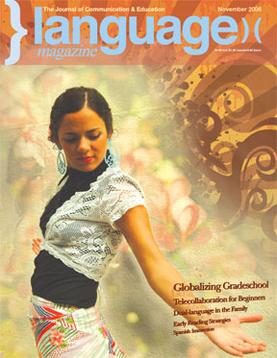
Language Magazine is a monthly publication that provides cutting-edge information for language learners, educators, and professionals around the world. Through promoting multicultural learning, global citizenship, and language education, Language Magazine provides well-researched insight on the literacy and language sphere of education.
Language Magazine
This is what the About page of Language Magazine says. So you may like this magazine if you’re a teacher or a learner who’s into language research and language learning.
The editorial team also publish the full issues in an app for tablets along with a digital edition that you can view or download if you subscribe.
Check out Language Magazine here.
11. The Relatable Voice Magazine
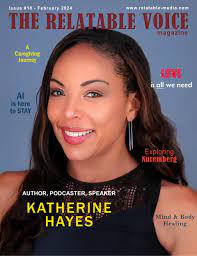
The creative director of The Relatable Voice Magazine is Lucia Matuonto, a multilingual lady from Brazil.
I talked about her in my blog about English podcasts too, as Lucia is also a podcast host and a big fan of real, personal, human stories (like me!)
In her magazine, you’ll find interesting interviews with a variety of people, from authors, film writers, and actors, to scriptwriters, songwriters, and content writers.
The magazine is free to read online and it’s perfect for you if you’re into media, culture, writing, books and, of course, real human stories!
Check out Relatable Voice here.
12. Health

Health is an e-magazine about…erm, well, health!
It was founded in 1981 and covers health and wellness information for everyone. Fancy another pub quiz type of question?
How many people does Health reach every year?
- Over 120 million people
- Less than 100 million people
- 1 million people
The answer is the first one. I think one of the reasons why it reaches so many readers is because the articles are reviewed by certified health experts such as, among others, doctors, nutritionists, and physicians.
The information they provide is accurate, research-based, and easy to digest for non-health experts.
This is also a great magazine if you’d like to expand your vocabulary around wellness, health conditions, nutrients, sleep, and everything that revolves around the topic of health.
13. British Council Magazine

The British Council is a British cultural institution that supports peace and prosperity by building connections between people in the UK and over 100 countries worldwide.
You may be excited to hear that the British Council has an online magazine written specifically for intermediate (B1) and upper-intermediate (B2) learners of English.
You can use this English magazine to practise your reading and learn about global issues, special days, festivals, and a wide variety of other topics.
But here’s the really cool thing about the British Council Magazine: each article has interactive exercises, worksheets, and guided reading activities to help you understand and use the language – a real gem for learners!
You can read British Council Magazine for free here.
14. Cosmopolitan

This is a cool American magazine directed by and targeted to women. It’s one of the best-selling magazines in America!
Remember what I said about The Economist, Forbes and all the other “formal language” magazines in this list?
That doesn’t apply to Cosmopolitan because the articles are written in an informal, conversational tone.
So this is a great one to expand your informal vocabulary and even learn new English slang words and expressions.
The articles focus on beauty, celebrity news, sex, relationships, politics, shopping, lifestyle, and many other interesting topics that, generally, appeal to a female audience.
The editorial team makes a promise on their “About” page:
Our content isn’t just fun—it is really, really fun though—it’s also thoroughly edited and fact-checked for accuracy, clarity, and fairness.
Cosmopolitan
15. Modern English Teacher
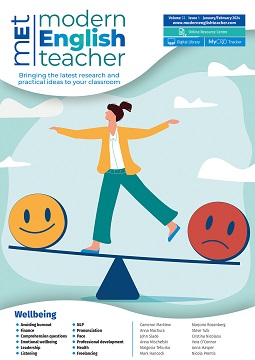
This is an amazing magazine for teachers of English who want to improve their English skills while developing professionally.
I’ve read Modern English Teacher many times and always found interesting articles about:
- classroom activities
- book reviews
- research on second language acquisition
- trends
- teaching approaches
- teachers’ stories
- news
- and other subjects related to the English language teaching industry.
This is a great read for professional teachers.
You can subscribe or read some of the articles online for free.
16. Mental Floss

This is an online magazine that has reached more than 1 billion (billion!) readers since 2001.
You’ll find smart, quirky articles about life’s big questions, fascinating facts, and such interesting stories that you can’t help but share them with your friends.
The tone of Mental Floss is informal, so this is another great resource if you’d like to expand your conversational vocabulary.
There’s a section of the magazine that’s entirely dedicated to language. I’ve had a quick look and found these quirky articles:
- Why Do We Say ‘Sweat Like a Pig’?
- 16 Funny Slang Terms for Children
- What’s the Correct Pronunciation of ‘February’?
Or how about their Amazing Facts Generator? I could spend all day clicking on the MORE FACTS PLEASE button! For learners like you, this will give some quick reading practice and lots of fun.
I think you’ll love Mental Floss!
17. The Travel Magazine

The Travel Magazine is a travel portal with highly informative, upbeat and inspirational articles for people who love to travel. We are storytellers.
The Travel Magazine
This is what the editorial team says about their e-magazine.
You can find a variety of articles about travel stories, travel advice, and plenty of reviews. Not just reviews of places but also theatre, product, app, cruise, and accommodation reviews.
Often the writers speak in first person and the style of the articles is informal and conversational. So The Travel Magazine may be the best choice for you if you’re a traveller who’s into reading travel stories written by the people who lived them.
You can also pitch the editorial team and write a story for them!
Check out The Travel Magazine here.
18. Aperture

You love learning English, you love reading, and you love photography. Am I right?
So there’s no better magazine for you than Aperture, a magazine that connects global audiences and supports both established and emerging artists.
The editorial staff’s core values are stated clearly on their website: care, curiosity, diversity, inclusion, and opportunity.
Let me tell you: the stories and the photos you’ll find in Aperture will make you dream with your eyes open.
If you’re a photography lover, don’t miss Aperture!
19. BBC Gardeners' World

What are some of the best ways to grow your own vegetables? How do you prune your hedge? What should you plant in February? What about March?
Green thumbs, BBC Gardeners’ World is here for you to help you answer all your gardening questions!
BBC Gardeners’ World is the UK’s best-selling gardening magazine that will help you expand your vocabulary around gardening while also helping you improve your planting, pruning, and watering skills (and other skills that good gardeners need to have).
The magazine also includes beautiful visuals of stunning gardens that will get you off your couch so you can take care of your plants.
Read or subscribe to BBC Gardeners' World it here.
20. Gourmet Traveller
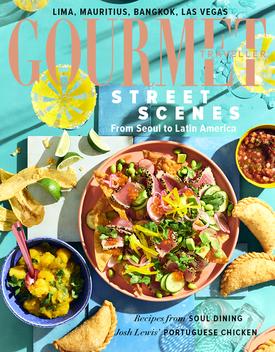
Australians are real foodies. No wonder many people consider MasterChef Australia as the best cooking TV show in the world. I even included in my list of best TV shows to learn English.
Australians also love travelling. So here you have Gourmet Traveller, Australia’s top food and travel magazine.
This magazine is for you if you’d like to discover innovative recipes from the best Australian chefs, reviews, and food news.
It’s also for you if you want to explore exotic destinations, luxurious properties, and unique travel experiences around the world.
The articles are written by professional journalists, so you’ll be exposed to some really high-quality writing.
Check out Gourmet Traveller here.

21. Bookmarks
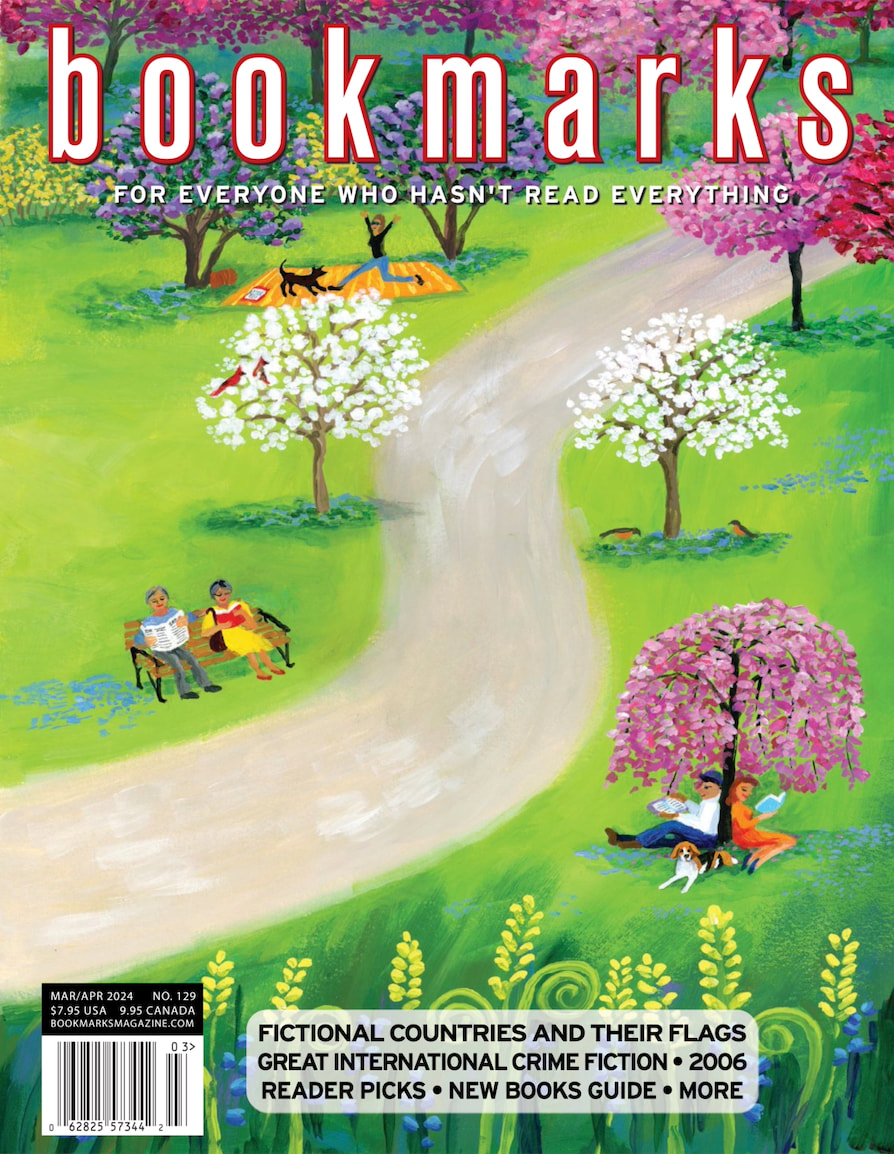
“If you are a lover of books, this magazine is heaven on earth,” says a reader of Bookmarks on the magazine’s website.
Another reader says, “You guys make loving to read easy!”
You get the point: Bookmarks is a magazine for book lovers.
The staff at Bookmarks read over 500 book reviews a month and then summarise them in each issue of the magazine.
There are reviews of a variety of literary genres: new fiction, nonfiction, historical fiction, fantasy and children's books.
Bookmark makes a promise:
By the time you're done with each issue, you’ll know what to start reading today. And you can save your precious reading time … for reading.
Bookmarks
So this is definitely an English magazine for you if you love reading (I’m sure you do) and want to make the best reading choices.
You can subscribe to Bookmarks here
22. PC World
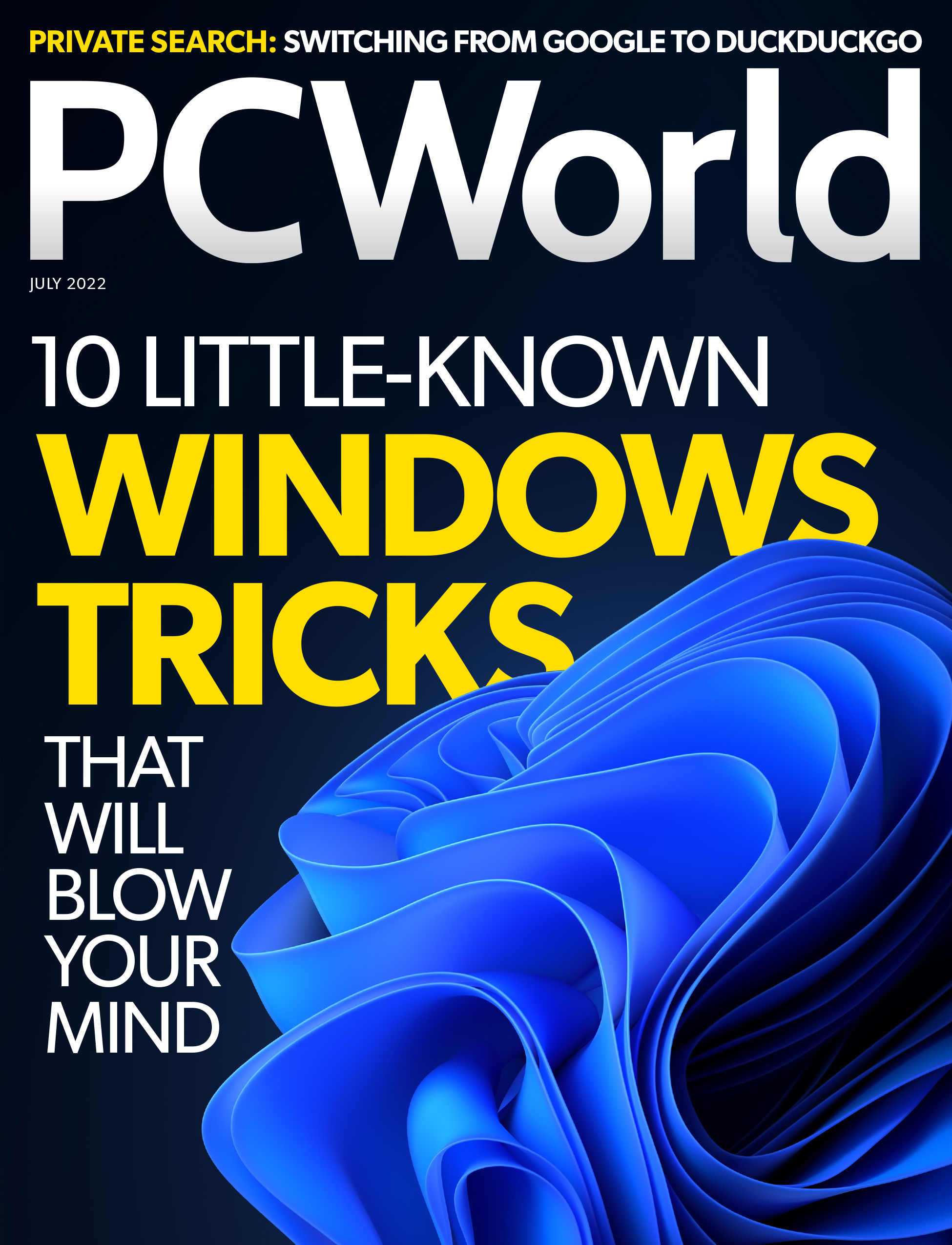
It doesn’t matter if you’re a computer expert or not, PC World helps you, in its editors' own words, “get more from the hardware and software that’s central to a PC-centric universe.”
This is a global computer magazine that’s been published digitally every month since 2013.
You’ll find tech reviews, how-to guides, shopping guidelines, computer deals, and everything else that revolves around the world of computers.
So PC World might be the best English magazine for you if you want to:
- get the latest tech news
- find the best computer accessories or programs
- get help to buy a new laptop
- or simply expand your vocabulary around the topics of IT (information technology) and computers.
23. Poets & Writers
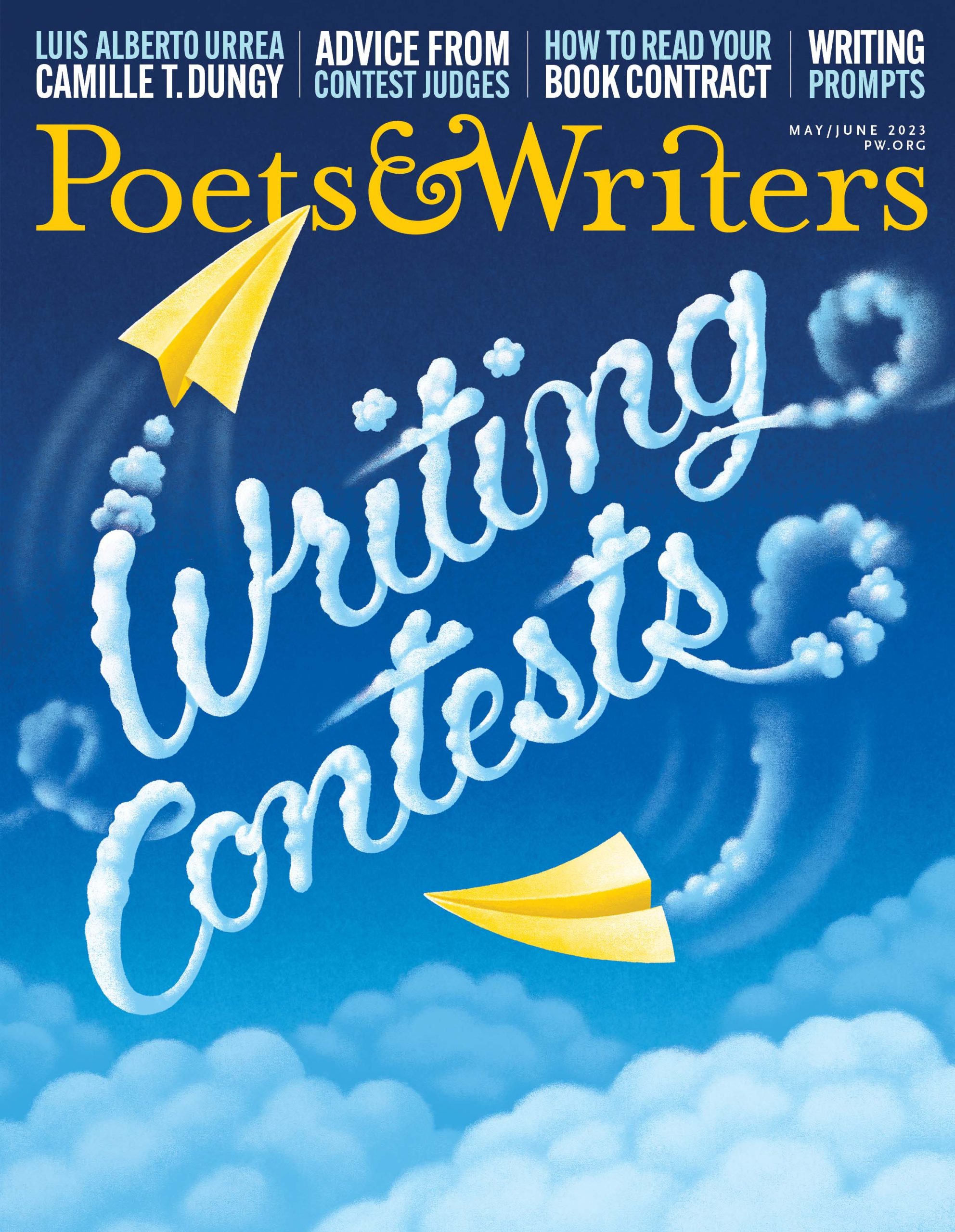
This is a US magazine for creative writers published twice a month. Each issue is read by more than 100,000 writers!
I’ve read a couple of issues too and found essays on the literary life, profiles of contemporary authors, lists of literary awards, reviews and many other things related to the world of writing.
They also publish creative writing prompts that can help you get started with writing. At StoryLearning we love not reading stories but also writing them, so I encourage you to get a pen (or a keyboard) and start writing a short story yourself.
I’m sure that reading Poets&Writers will give you some inspiration.
You can find Poets &Writers here.
24. The World Of Interiors

The World of Interiors is an interior design magazine founded in London in 1981.
It’s published monthly in print and daily on its website and digital platforms.
You’ll read about design, decorating, arts, architecture, gardens and culture.
The articles use plenty of descriptive language so this is a great magazine for you if you’d like to build and refine your vocabulary to describe places, furniture and homes.
The World of Interiors website has also a section called “Film” where you can watch short clips about all things interior design.
This, too, is useful for you as a learner of English because you can first read an article and then watch a video to help you absorb the information and the language as well.
Check out The World of Interiors here.
25. Rolling Stone

Last but not least, Rolling Stone! You may have heard of this magazine as it’s a really popular one.
It also has several international editions so you may have read it in your first language.
In case you don’t know, Rolling Stone is an American monthly magazine about music, politics, and popular culture that was founded in San Francisco, California, in 1967.
Shall we do the last pub quiz question? Great, here it is:
The first issue of Rolling Stone was released on November 9, 1967. At the time, Rolling Stone was published in newspaper format. Who was on the front page in the very first issue?
- John Lennon
- Aretha Franklin
- Mick Jagger
No, sorry, the answer isn’t Mick Jagger, The Rolling Stones’ frontman. The correct answer is John Lennon!
Want to read Rolling Stone? Well, then reading the story of the first issue here may be a great start.
Finding The Best English Magazine For You
This was a long list, wasn’t it? It’s great that you made it to the end! But let me tell you that I could have gone on talking about other magazines in English because there are so many out there.
I hope you found an English magazine for you. If you haven’t, I encourage you to explore the web and look for one that you’d love to read.
Look for an English magazine that’s about a topic or a hobby you’re interested in. For example, if you’re interested in boats, find a magazine about boats. That way you’ll expose your brain to a lot of English while reading about a topic you love.
It’s one of the best ways to learn a language!
So…go and have fun!


Olly Richards
Creator of the StoryLearning® Method
Olly Richards is a renowned polyglot and language learning expert with over 15 years of experience teaching millions through his innovative StoryLearning® method. He is the creator of StoryLearning, one of the world's largest language learning blogs with 500,000+ monthly readers.
Olly has authored 30+ language learning books and courses, including the bestselling "Short Stories" series published by Teach Yourself.
When not developing new teaching methods, Richards practices what he preaches—he speaks 8 languages fluently and continues learning new ones through his own methodology.










































